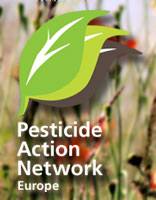02 July 2008
UK government lobbies to keep hazardous pesticides on the menu
The UK government is today participating in a media initiative aimed at attacking proposed European legislation that would remove the most hazardous pesticides from food produce grown in the EU.
Speaking with journalists assembled in London, Ian Dewhurst, Principal Toxicologist at the UK 'Pesticides Safety Directorate', is expected to reiterate the Government's position that the removal of carcinogenic, mutagenic and reprotoxic pesticides from food products would secure 'no significant health benefit for consumers'.
'The UK Government's approach to pesticide legislation is extremely disappointing', said Elliott Cannell, a spokesperson for Pesticide Action Network Europe. 'Cancer is the second biggest cause of death in Europe.
So it makes real sense to ensure that carcinogenic and mutagenic pesticides are no longer common contaminants in fruits and vegetables'.
'All of the other major agricultural producers in Europe, including France, Germany, Spain, and Italy, are pushing for the removal of hazardous pesticides from European food products. It's an insult to common sense that the UK should try to hold back progress across the EU.'
Commenting on the UK's official position, Professor Vyvyan Howard, toxico-pathologist at the University of Ulster, and a member of the Government's Advisory Committee on Pesticides, said, 'It has been my position for many years that a precautionary reduction in the levels of the most hazardous pesticides by substitution makes good sense. The fetus and infant are particularly vulnerable to exposure. The EU proposal to use hazard assessment is a pragmatic way forward.'
'What I find most absurd is the claim that the EU proposals are not based on science. Hundreds of thousands of pounds are spent analysing the characteristics of each pesticide substance approved for use, and whole teams of national and European scientific experts are involved. Where a specific pesticide is classified as being carcinogenic it's because there is substantive scientific evidence linking that substance with cancer.'
The proposal to remove the most hazardous pesticides from European food produce is also supported by the Cancer Prevention and Education Society.
Media Contacts
For further comments on the proposed EU legislation please contact:
Elliott Cannell. MSc (Oxon)
PAN Europe
tel +44 (0)20 7065 0920
mob +44(0)7960 333 517
For further comments on the health impacts of hazardous pesticides contact:
Professor C. Vyvyan Howard. MB. ChB. PhD. FRCPath.
University of Ulster
tel +44 (0)28 7032 3383
mob +44 (0)79732 47833
Vyvyan Howard is a medically qualified toxico-pathologist specialising in the problems associated with the action of toxic substances on the fetus and the infant. He is Professor of Bioimaging at the University of Ulster. He is currently investigating the effects of drugs, environmental pollutants and food additives in a variety of developmental assays.
Professor Howard has written a number of papers and book chapters and spoken in a variety of forums to draw attention to the threat posed by environmental pollutants to the developing fetus. He is a Fellow of the Royal College of Pathologists, Past President of the Royal Microscopical Society, Member of the British Society of Toxico-Pathologists, President of the International Society of Doctors for the Environment and Member of the European Teratology Society. He has been a member of the DEFRA Advisory Committee on Pesticides since 2003.
— ENDS —
Notes to editors:
- The UK Government's position
Speaking at Agriculture and Fisheries Council held in Luxembourg on 23 June 2008, Hilary Benn, the UK Secretary of State for Environment, Food and Rural Affairs said that EU proposals to eliminate the worst carcinogenic, mutagenic, reprotoxic and endocrine disrupting pesticides from EU food products would secure 'no significant health benefit for consumers'.
- Cancer Prevention & Education Society
The Cancer Prevention & Education Society is a charity registered in England and Wales. More information about cancer and chemicals can be found on its website: www.cancerpreventionsociety.org
- No losses of yields
Representatives of the pesticides industry's have made frequent forecasts that the elimination of hazardous pesticides will affect a high proportion of pesticides currently approved for use in the EU. Estimates prepared by the European Commission suggest less than 5% of active substances would be affected. This figure is supported by an assessment conducted by PAN Europe, and is within the parameters of
- 'Essential' pesticides will stay on the market
The draft text adopted by the Agriculture and Fisheries Council includes a specific derogation whereby any pesticide substance judged to be 'essential' in pest control, and where there are no other available pesticide alternatives, shall be allowed to remain on the market - regardless of its hazardous characteristics. This represents an in-built safety feature of the proposed legislation that serves to guarantee categorically that it will have no negative impacts on EU agricultural productivity.
< Back


